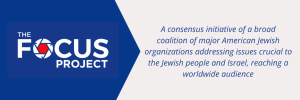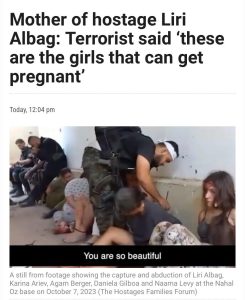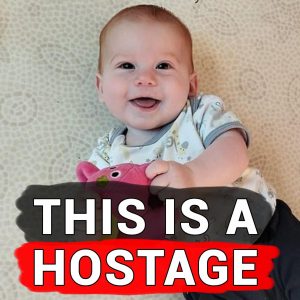
BACKGROUND – TALKING POINTS – ACTIONS – VOICES – MYTHS & FACTS – STORIES
![]()

“Blessed are You, Lord our G-d, King of the Universe, Who sets captives free.” This Jewish blessing, recited in morning prayers, has carried even more profound meaning since the 10/7 Hamas attack on Israel. This simple prayer for freedom and peace resonates as 100 hostages continue to endure unimaginable horror. A shifting dynamic in the region has opened the possibility of a hostage release that brings hope to Jews in Israel and around the world, as the festive holiday of Hanukkah approaches.

Continuing Hell for the Hostages
For more than a year, the hostages held in Hamas captivity endure physical abuse, unrelenting psychological torture and even death. The Israeli Defense Forces recently recovered the body of Itay Svirsky, 38 – murdered by Hamas terrorists in February. Itay was last seen in a Hamas propaganda film released in January.
Another hostage in the film was Noa Argamani – one of the most well-known faces of the Hamas massacre. Noa was rescued by the IDF in June. Noa: “I was injured in captivity: bleeding, with my entire head open, and no one came to help me. Not the Red Cross, not doctors, no one. Israeli doctors said it was a medical miracle that I lived. We don’t know the condition of the 100 hostages still there, and their fate might be worse than mine.”
Hamas continues to hold 13 women hostage – including the body of Israeli American Judy Weinstein Haggai. Judy was a teacher of children with special needs and meditation. Her children: “There is nothing more monstrous than abducting a body and not letting us, their children, their grandchildren, our grandmother find closure. We are stuck. We cannot move on with our lives until her body is returned.”
Deafening Silence: ‘Bring the hostages home now!’
The sister of hostage Romi Gonen is a nurse shocked by the silence of international medical and women’s rights organizations. “I feel betrayed from the medical world and from the women’s world in ways that I never imagined that I would feel,” said her sister, Yarden. “The infections, the diseases, the immune system, my sister’s gunshot wound – why aren’t they speaking on behalf of innocent people? Hamas is mentally, physically and sexually abusing everyone. Girls can get pregnant, because terrorists rape them. We currently have 100 hostages, but maybe we have 101, 102 or more.”

The mother of Israeli American hostage, Keith Siegel, recently passed away before reuniting with her son. Keith’s daughter, Elan: “My dad won’t be able to say goodbye to the woman who raised him and loved him his whole life.” Slain Israeli American Omer Neutra was remembered as a “hero of Israel” at a recent NY memorial service. Each funeral serves as a stark reminder of the urgent need for action.
Hamas kidnapped Gadi Moses – a peace activist. He founded an agricultural kibbutz and pioneered farming and wastewater methods that improved lives around the world. Gadi’s son, Oded: “My father always believed in peace and coexistence and educated us to love all people, no matter their religion or nationality. What was done to us on Oct. 7 is a nightmare. Americans: Raise your voices and speak out in name of the hostages. Push your government representatives at every level to bring my father home!”
Shifting Balance of Power: Hamas on the Defensive
Israel’s military successes against Hamas and Hezbollah, and now working to neutralize Syria’s threat, have opened the door to more realistic negotiations with Hamas and diminished Iran’s ability to supply weapons to its proxies in the Middle East.
The negotiating position of Hamas has been weakened because its fighters and infrastructure have been decimated by Israel. However, the battle against Hamas has come at great cost to Palestinians living in Gaza. Hamas builds its militant capabilities into civilian infrastructure, including homes, hospital, schools and mosques. The Israeli goals throughout this war have been the release of all hostages and disarming of Hamas, all while trying to minimize civilian casualties.
International mediators, including America and Hamas-ally Qatar, have expressed cautious optimism on the hostage negotiations, pointing to “encouraging signs.” Hamas has agreed to a temporary Israeli military presence in Gaza during a ceasefire – which it previously opposed – but the Iran-backed terror group continues with stalling tactics. The Hamas manipulation highlights it cruel and calculated strategy to extend the suffering of Israelis and Palestinians.
Israelis are more eager than ever to negotiate from their position of strength. One poll revealed that a majority of Israelis support ending the war if all the hostages are released. However, the current offer calls for 30 hostages in exchange for a 60-day ceasefire and Israel releasing imprisoned terrorists.

Shifting Balance of Power: Israel Helping to Reshape the Region
Decisive campaigns have dealt crippling blows to Iran’s crumbling axis of power. Nowhere is this more evident than in Syria – once Iran’s main weapons pipeline to its proxies – that has been completely incapacitated by rebels that overthrew the Assad government. The IDF led a historic pre-emptive campaign that destroyed more than 80% of Syria’s military. Israeli strikes have eliminated air defenses, weapons depots and supply routes that once funneled advanced arms to Hezbollah and other Iranian proxies. Israel has secured immediate military objectives by preventing these arsenals from falling into hostile hands and pre-empted long-term threats to its existence and security. At the same time, dozens of American airstrikes eliminated ISIS camps in Syria.
The ripple effects of these operations are already visible, showing growing cracks in Iran’s influence and power. Assad’s regime in Syria – a longtime lynchpin of Iranian regional influence – has been defeated by rebel forces after a long, bloody civil war. Civilians are celebrating and expressing relief at the downfall of an oppressive regime, but many remain cautious – especially Christians. Iran-backed Hezbollah forces in Lebanon face increasing isolation and logistical challenges.
An Iranian opposition leader asserted that the fall of Assad’s regime paves the way to topple the Iranian regime. Israel’s prime minister stated in a video appeal to Iranian citizens: “One day, Iran will be free.” American leaders are crediting Israel’s operations against Hezbollah for accelerating Assad’s downfall.
Iranian threats to Israel and regional stability remain. The Houthis in Yemen – terrorists devoted to killing Americans and Jews – continue to regularly fire missiles and drones into Israel. Many have been intercepted, but one recently struck an apartment building near Tel Aviv. The Houthis also are attacking cargo ships in the Red Sea and Gulf of Aden. The U.S. air force continues to target sites used by Iran-backed rebels.
A Hanukkah of Resilience
For American Jews, Hanukkah arrives amid rising anti-Jewish violence and growing fears about openly expressing Jewish identity. This year, the Hanukkah candles represent more than a celebration of ancient miracles. They are a symbol of strength, resolve and an unwavering commitment to securing freedom, dignity and peace for Jews everywhere.

![]()

![]()

A. Demand all hostages held in Hamas captivity to be released NOW!
Amplify their stories by sharing names, faces and experiences of the hostages on social media and within your community to build support and a sense of urgency for ending needless. Contact your U.S. Representative and Senators to demand they take strong action to pressure Hamas for the immediate and unconditional release of all hostages. Innocent lives cannot be bargaining chips.
B. Jews and non-Jews can stand together during Hanukkah and Christmas.
Display symbols of support – a menorah, a Jewish star or an Israel flag – for Jewish pride. Join interfaith events that celebrate unity, light and resilience. Standing strong and united during Hanukkah and Christmas sends a powerful message against hatred.
![]()

Former Israeli Hostage Sapir Cohen’s Prayer for Survival
Sapir Cohen, 30, was held in captivity by Hamas for 55 days before being released in a deal with Israel. She found faith during her captivity:
“My story begins six months before captivity. I felt that something very bad will happen to me and I didn’t know why I felt like that because all my life was perfect. I was looking for a prayer and one day on my Instagram was the suggestion to recite Psalm 27 for 30 days in a row for healing. The last day was Oct. 7. I remember being confused that this psalm talks about enemies and evildoers, but I wasn’t fighting enemies. I thought I was sick. How did this apply to me?
On Oct. 7, I understood the meaning of this prayer. I remembered the words of the psalm, and I knew: I would survive. I was terrified, all my body was water, I was shaking and I say the prayer again and again and again. When I say I felt it deep inside me, I felt peace and I didn’t understand how can I feel it in this situation.
I recited the prayer every day in captivity. I thanked G-d for all the angels He sent me in this hell. When I came back to Israel, I saw how many people prayed for me. I understood that all the angels I felt were not imaginary.”
Click hear to listen to Sapir’s story.
![]()

YOU MAY HEAR: Israel is preventing a hostage deal. Reality: Hamas’ refusal to release hostages continues by manipulating hostage lists, issuing false demands and stalling negotiations. Israel remains committed to securing their safe return, but Hamas exploits civilians as leverage in violation of international law and basic human decency.
YOU MAY HEAR: Israel’s military operations endanger the hostages. Reality: Hamas deliberately hides hostages in tunnels and combat zones, putting their lives at greater risk. Israel operates with as much precision as possible to dismantle Hamas infrastructure while striving to protect the hostages and minimize harming Palestinian civilians.
YOU MAY HEAR: The hostages are safe and treated well in Gaza. Reality: Released hostages have recounted severe abuse, starvation and psychological trauma in Hamas captivity. These conditions violate all international standards of humane treatment and highlight the urgent need for their immediate release.
![]()

American Jewish Women Feel Isolated, Afraid and Threatened
Hadassah – The Women’s Zionist Organization of America – recently released a report, From Fear to Resilience: Women Facing Antisemitism. Jewish women shared stories about being isolated and excluded by people they used to call friends. They have been singled out at work and customers have abandoned their businesses. They are surrounded by misinformation. They have been yelled at by strangers. Their children are being harassed at school. They are attending synagogue while watching the door for a violent attacker. Many feel unsafe showing symbols of their faith publicly and are hiding their identities:
American Jewish women also are standing up and fighting back against antisemitism. Some are purposefully choosing to wear their Magen David (Star of David) necklace, proudly displaying their mezuzah on their doors or their menorahs in their windows and flying their Israeli flags. Mothers are teaching their children what it means to be a Jew and a Zionist. Despite feeling scared and worried, women are finding empowerment and resilience.
Stories Impacting American Jews
Stories Impacting the U.S. and Israel
Stories From Around the World
![]()
In light of the surge of current relevant news, please subscribe to our Daily News Brief, a digest of critical news headlines curated from thousands of media addressing issues that affect the Jewish world.
![]()

This content is developed by The Focus Project in partnership with MERCAZ USA. The Focus Project distributes weekly news and talking points on timely issues concerning Israel and the Jewish people, including antisemitism, anti-Zionism and the delegitimization of Israel. It represents a consensus view across a spectrum of major American Jewish organizations. MERCAZ USA recognizes and respects the diversity of views on these issues among its readers and the community at large.
![]()